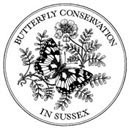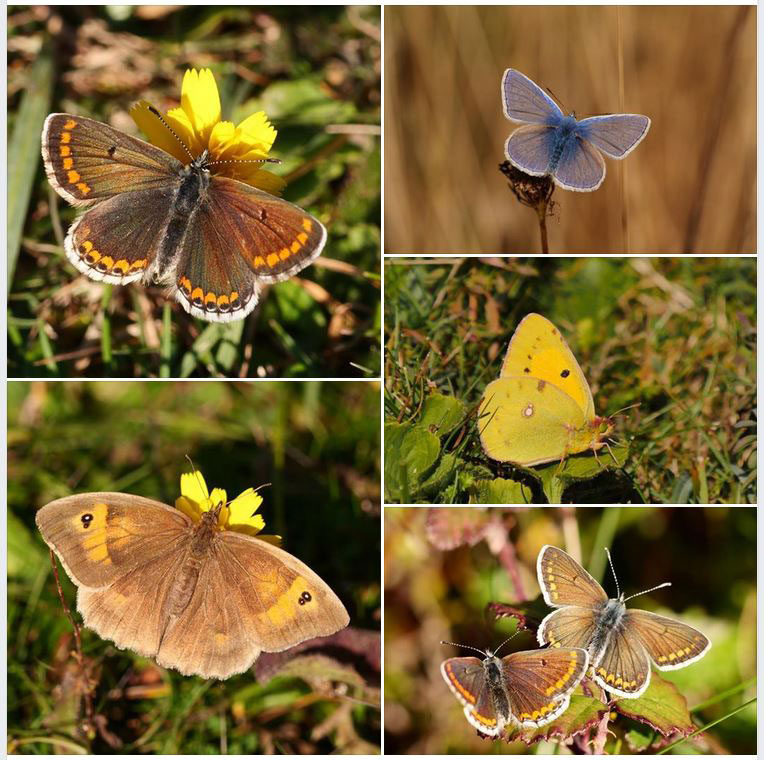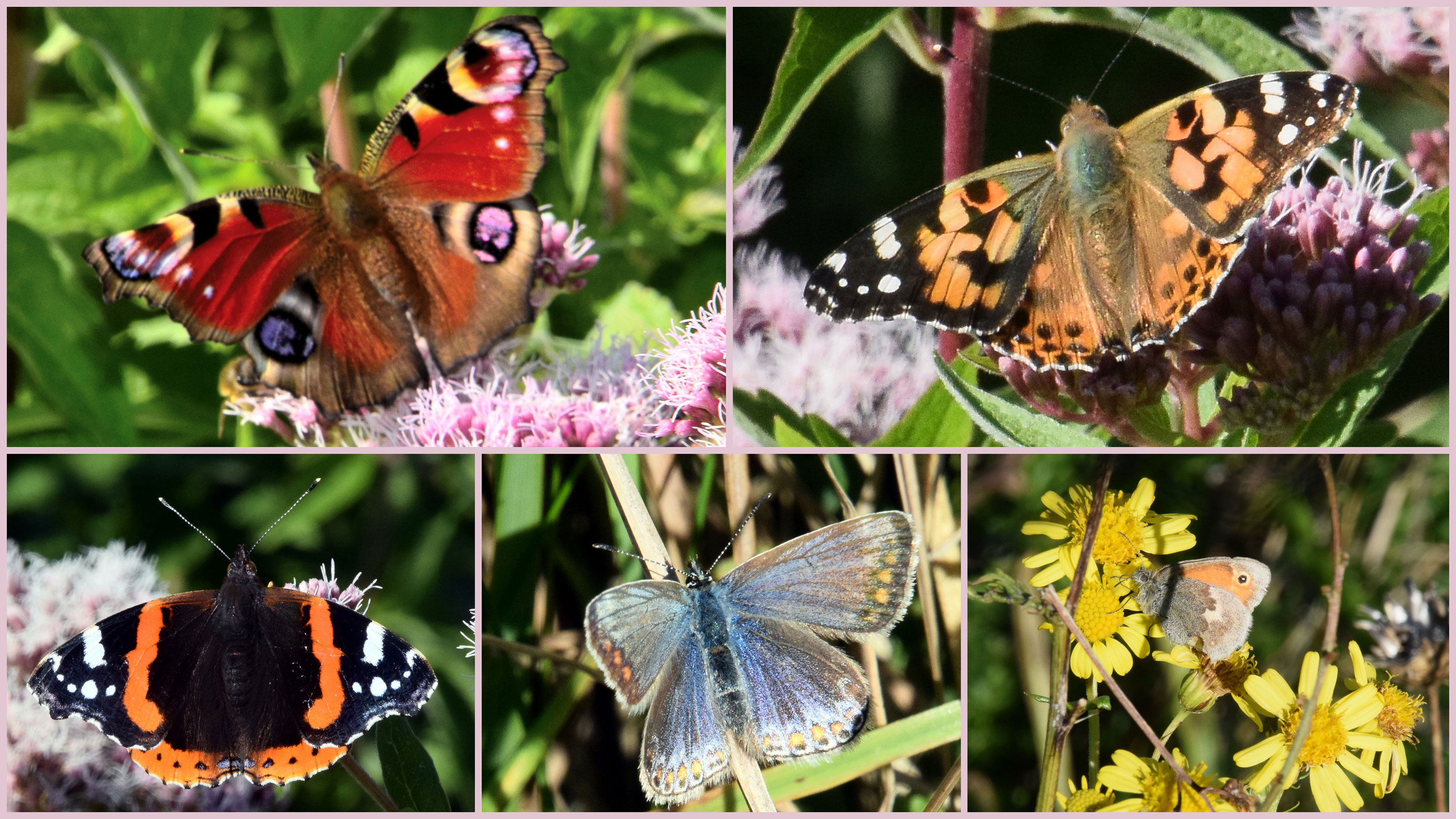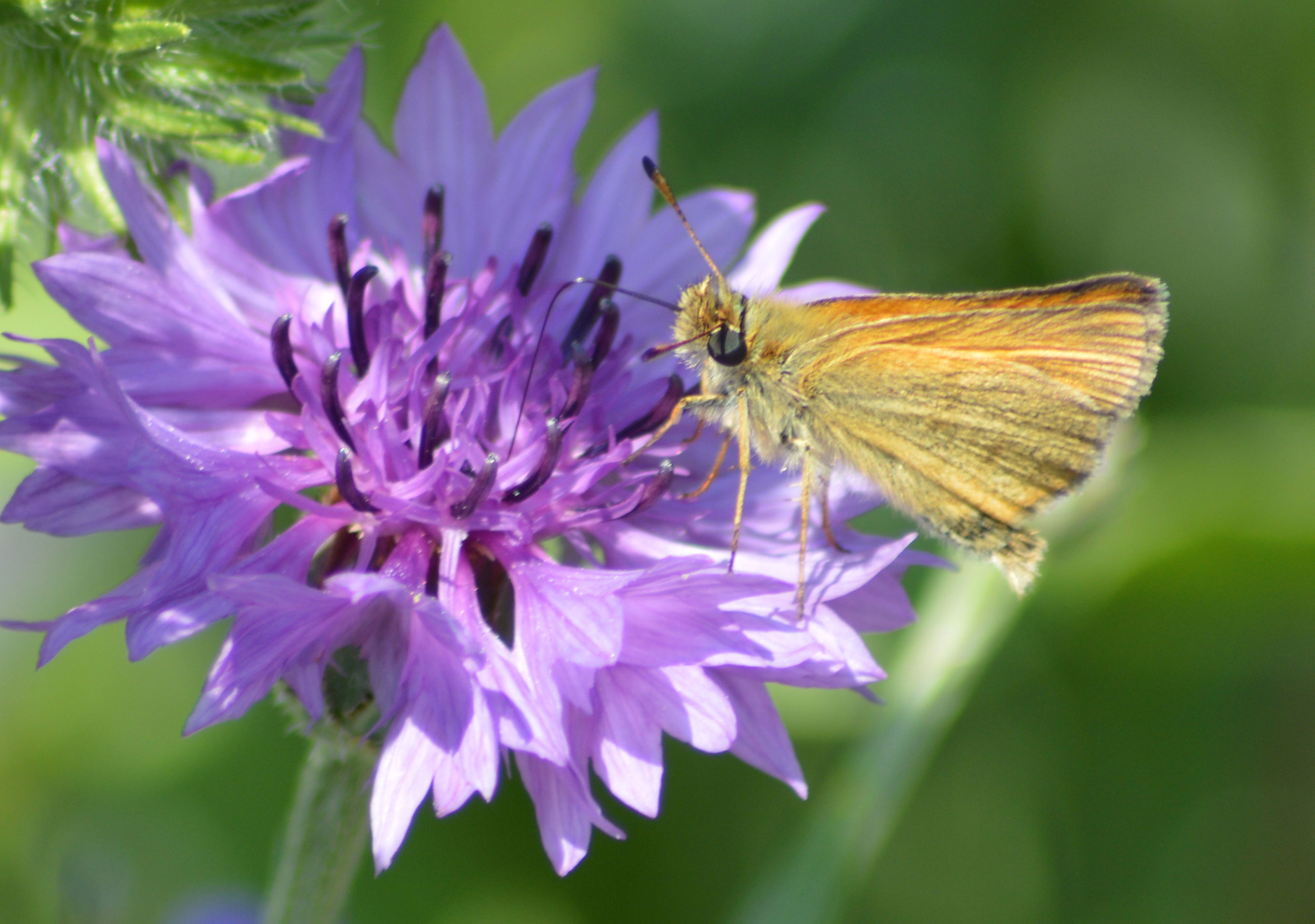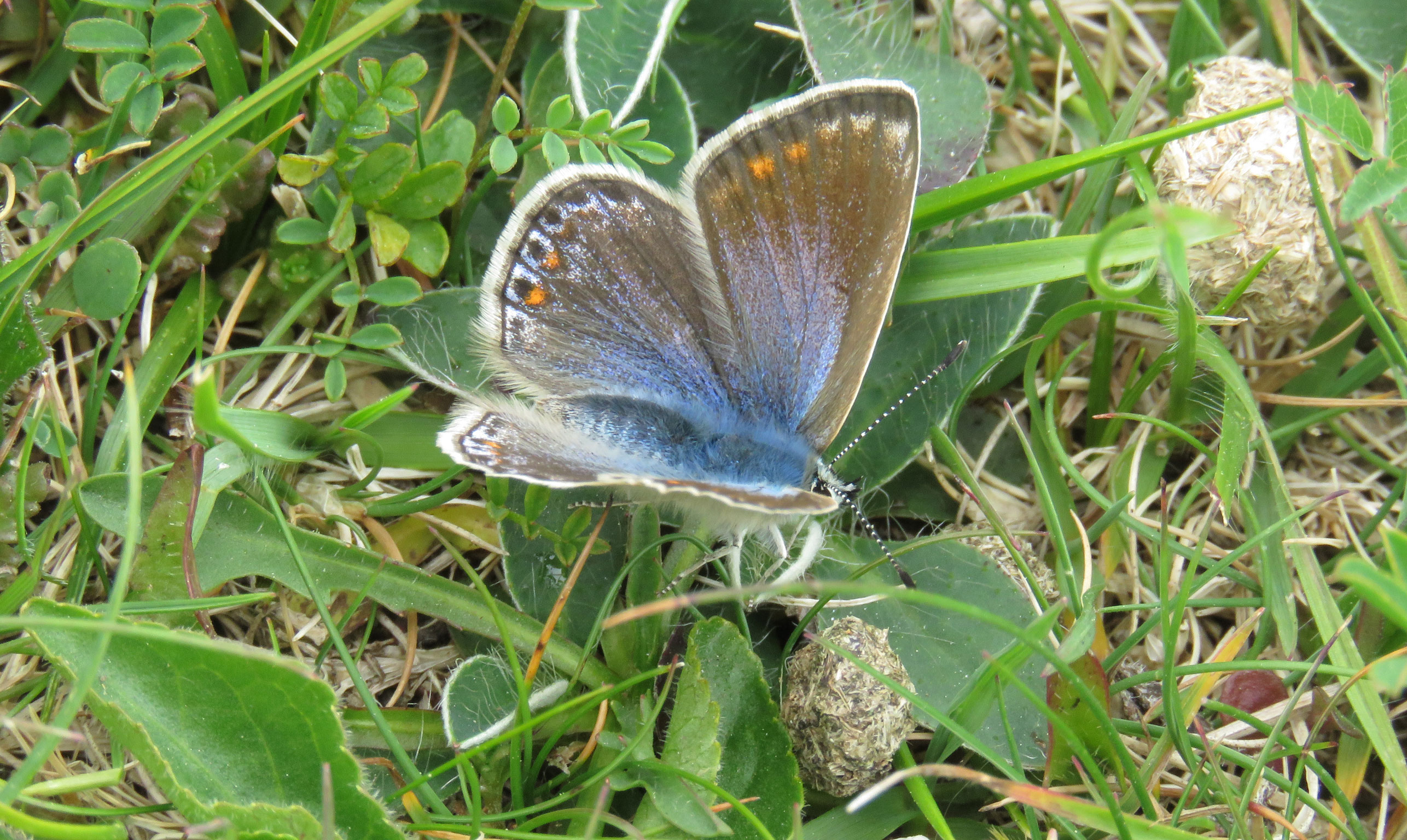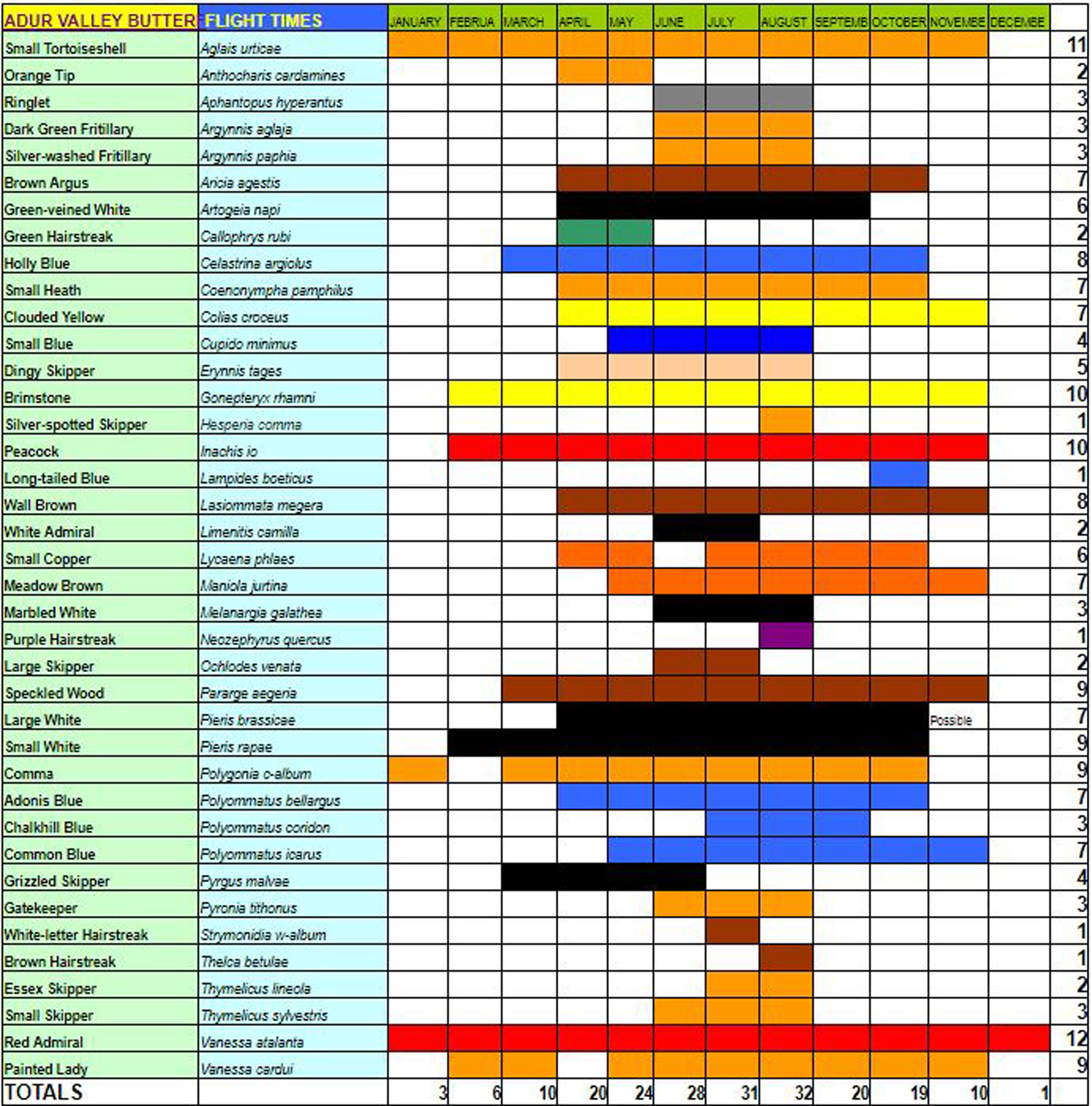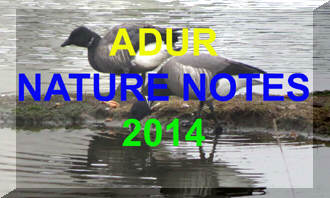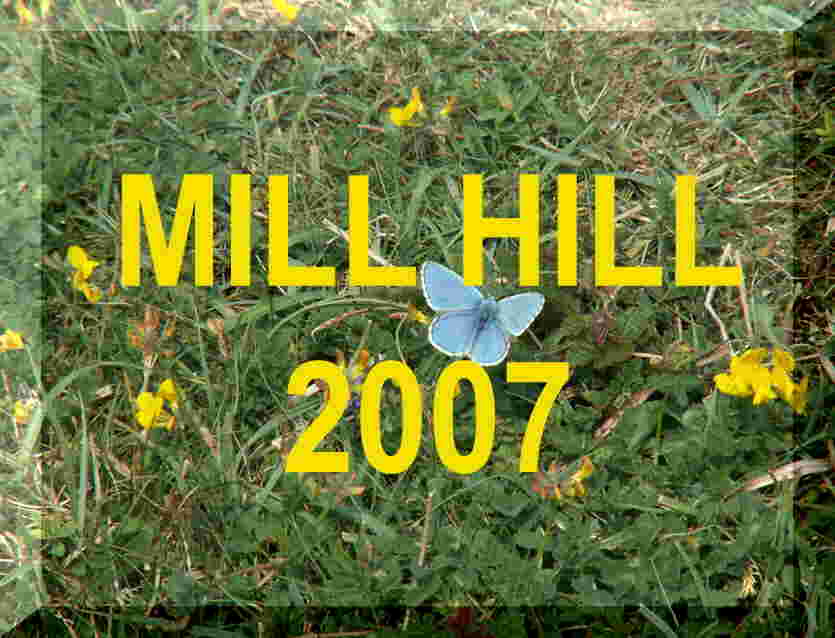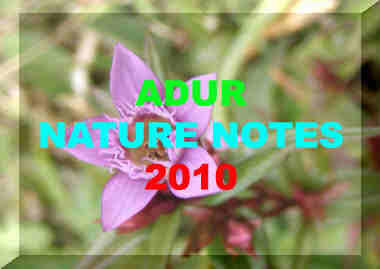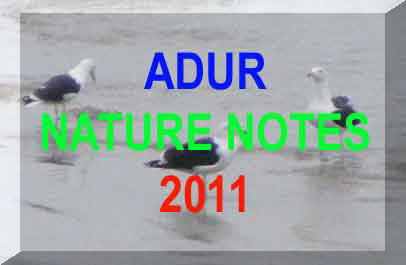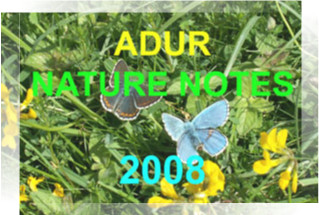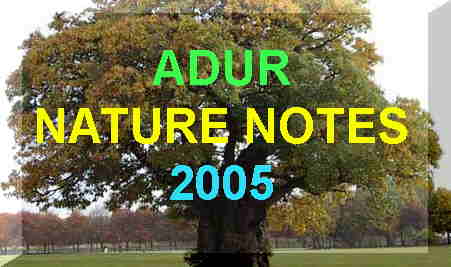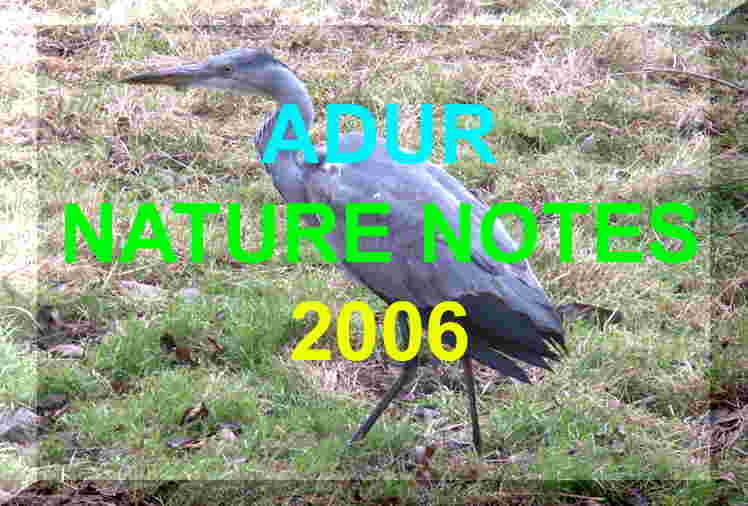 All
observations by Andy Horton, unless stated otherwise.
All
observations by Andy Horton, unless stated otherwise.|
|
|
|
|
|
|
|
|
Sussex
Butterfly Reports (Butterfly Conservation Society)
UK
Butterflies: Sightings
Adur
Butterfly Species
Adur
Moths
Adur
Butterfly Flight Times
Adur
Butterflies: First Dates
Adur
Skippers
Adur
Nature Notes 2011
Adur
Butterfly List 2010
Adur
Butterfly List 2011
Adur
Butterfly List 2012
UK
Butterflies & Moths (alphabetical order by common name)
Sussex
Moth Group Sightings
Diapause
(=hibernation)
UK Leps Taxonomic Butterfly List
WILDLIFE
REPORTS
(Narrative):
29
December 2018
A
Red
Admiral Butterfly fluttered under the
canopy of Shoreham-by-Sea
railway station.
30
November 2018
After
three days of rain and winds gusting to Gale Force
8 the weather
brightened up and there was a Clouded
Yellow and a Peacock
Butterfly on the lower slopes of Mill
Hill around midday.
14 November 2018
More images of the action from Mill Hill in the form of an ovipositing Clouded Yellow. Also seen were a further 5 male Clouded Yellows, 3 Common Blue, Brimstone and Comma.
13
November 2018
A
return visit to Mill
Hill (upper slope) at lunchtime produced
another fairly fresh Clouded Yellow
and a shy Speckled Wood.
12
November 2018
Ten
days since my last visit to Mill
Hill: the bright and breezy conditions
produced two Clouded Yellow,
Brown
Argus, another fresh Common
Blue and a Red
Admiral.
10
November 2018
A
quick trip to Mill
Hill in the morning with the car thermometer
at 13°C. With the sun out it was much warmer and I quickly spotted
a Meadow Brown.
A short while later a Peacock
flew by. There were several Clouded Yellows
and perhaps half a dozen Common Blues
of both sexes. One male looked remarkably fresh.
5
November 2018
An
immigrant Hummingbird Hawk-moth,
Macroglossum
stellatarum,
visited
a purple Salvia flower in
a Shoreham town back yard.
2
November 2018.
A Painted Lady Butterfly visited one of the occasional remaining Greater Knapweed flowers near the upper car park on Mill Hill.
Brown
Argus,
Common
Blue,
Meadow
Brown,
Clouded Yellow, Brown
Argus
November
Butterflies
Photographs
by Dave Cook
It was just too good to stay at my desk and so headed to Mill Hill. Under clear blue sky and light wind, it wasn't long before I had my first, albeit brief, sighting of a fresh female Common Blue as I was walking down the steps towards the lower slope. By the time I reached the northern end I had 6 male Clouded Yellow under my belt. In the bottom corner were numerous mix of male and female Common Blue, most in various states of ‘worn’ but one male stood out as a minter. On my return I spotted what I initially thought was a Common Blue pairing when who should show up but Vince. He and I spent the best part of an hour discussing this very late phenomena for a Common Blue pairing when we suddenly noticed the possibility that one of them could actually be a Brown Argus (you'll see what we mean in the photos as the tell tale figure eight is very indistinct on the male). The pair then rotated 180° so we got a good view of both sides and realised they they were in fact both Brown Argus. A very fresh Meadow Brown was also seen along with a very large Small White and a Red Admiral.
These
were the first two local reports of both Brown
Argus
and Small White in the month of November.
Adur
Butterfly Flight Times
29
October 2018
A
Painted
Lady Butterfly was seen in Shoreham.
A Red Admiral fluttered over my head in the early morning, over the twitten at the Corbyn Crescent end to Adelaide Square, Shoreham.
25
October 2018
Two
Red
Admirals fluttered over my head, one over
Widewater
and the second one over Lancing town centre.
23
October 2018
A
Small
White Butterfly sharing a Dandelion
with a Red-tailed Bumblebee on
an Erringham Road verge, north Shoreham is only worth a mention as possibly
the last butterfly
of the year. There was a chill on the northerly
breeze in the afternoon and no butterflies
were seen on the upper part of Mill Hill.
9 October
2018
As
the afternoon wore on, the sun came out under a clear blue sky.
Already the most likely flutterings were falling leaves, but I spotted
a Large White Butterly
over the verges of the Down's Link Cyclepath
at Old Shoreham, which prompted an unplanned visit to the top part of MiIl
Hill . The new growths of Hemp Agrimony
attracted five Red Admirals
on the middle gentle slopes of MiIl Hill near the Copse. I made a passage
journey twice over the top plateau without seeing any butterflies.
28
September 2018
A
Speckled
Wood Butterfly fluttered amongst the row
of Elms
just above where the high tide laps against the
A27
main road between the Norfolk
Bridge and the small bridge to the tidal
pool known as the Flood Arches.
26
September 2018
Under
a hazy blue sky, the new growths of Hemp
Agrimony attracted the vanessid
butterflies on the middle gentle slopes of
MiIl
Hill near the Copse. These were Red
Admirals, Peacocks and a Painted
Lady Butterfly. Other butterflies
seen on the top part of MiIl Hill included occasional widespread Small
Heaths, occasional
Common Blues
localised to the Marjoram
meadows, one Meadow
Brown
on
the plateau, one Wall Brown
which was the only butterfly seen in the top meadow, and a Large
White.
Crane-flies
were frequently seen as well as few Common
Darters (a small dragonfly).
A pair of Speckled Woods
were seen by Hamm Road allotments in Shoreham town.
Butterflies on Mill Hill
17 September 2018]
With
most of the flowers finished for
the year, there were still enough nectar plants on the top of Mill
Hill to sustain over thirty butterflies
of eight species. Small
Heaths led the way with more than a dozen
disturbed on bicycle passage over the short turf paths over the upper plateau.
There were a handful more on the middle slopes where they were exceeded
by at least fifteen mostly fresh Common
Blues and accompanied by a handful Meadow
Browns,
a few Large White Butterflies,
a male Adonis Blue,
and most impressively two or three pristine and flighty Wall
Browns. The seventh species was a Speckled
Wood in the top Copse. The eighth species
was a Peacock Butterfly
attracted to the fresh growths of Hemp Agrimony.
Eight
species of butterfly
16
September 2018]
There
were a few butterflies
along the Down's Link Cyclepath from south
of the Cement Works,
notably a male Common Blue
in good condition.
10
September 2018
There
was the usual Kestrel
over Mill Hill, but that hardly warrants
a mention. Nine species of butterfly
including 25 Adonis
Blues
that
were disturbed in the afternoon under a cloudy
sky over the downs. This was nine blue males
and sixteen brown females,
which all had to be disturbed as they were not actively fluttering around,
although one or two visited nectar flowers
after they took flight. The frequent 15+ Small
Heaths were more lively. Frequent 12+
Meadow
Browns
were
not so lively. There were at least four Common
Blues at the far northern end of the lower
slopes. Large White Butterflies
fluttered about. I spotted a resting Treble-bar
Moth and I disturbed a few faded to brown,
pyralid
micro-moths
Pyrausta purpuralis..
Speckled
Wood, Meadow
Brown,
Adonis
Blue
Clouded
Yellow, Adonis Blue
Butterflies
on Mill Hill
Immigrant
butterflies
included a couple of restless Clouded Yellows
over the lower slopes and a faded Painted
Lady near the upper car park. There were
was a Speckled Wood
near the top Copse.
There
were also three Speckled Woods at
the top of Chanctonbury Drive and a probable Holly
Blue.
Nine
species of butterfly and one macro moth
9 September
2018
A
few Speckled Woods
were seen over the shady parts of a passage visit along the
Downs
Link Cyclepath from Erringham Gap to just north of the Cement Works
Another
medium-sized moth was discovered in my kitchen and released. It was another
Lesser
Yellow Underwing Noctua
comes.
There
was a smaller fawn moth L-album Wainscot,
Mythimna
l-album, as well, but I could not
capture it.
Adur
Moths 2018
8 September
2018
A
partially colourful Red Underwing Moth,
Catocala
nupta,
found its way into my upstairs
bathroom in Shoreham. It was trapped and released but flew away rapidly
before I could get a photograph.
6 September
2018
A
dozen Clouded Yellows
and a surprise Brown Hairstreak
were found at Southwick Basin with other butterflies.
Red Admiral
A Lesser Yellow Underwing Moth Noctua comes, found its way into my upstairs kitchen in Shoreham. It escaped through a partially open window.
Adur Moths
4 September
2018
There
were no butterflies
seen on Mill Hill Cutting (SW).
3 September
2018
An
immigrant Clouded Yellow Butterfly
was seen flying near the Tollbridge,
Old Shoreham in the middle of the day. And another one was seen in the
afternoon over Anchor Bottom. Adonis
Blues
were common over the large expanse of the conservation pastures of Anchor
Bottom: I counted 37 (30 males
+7 females) in
a timed 45 minutes, almost all of them in the central south-facing bank
area in the space of 16 minutes. There were many more in the areas I did
not visit and Lindsay Morris
recorded over one hundred (182) in four hours.
Adonis
Blue ![]()
With a different flora to Mill Hill, the Adonis Blues were nectaring on the abundant Rough Hawkbit., noted visiting the diminutive Squinancywort hidden amongst the grasses, attracted to the occasional tall Carline Thistles, once seen on the few Round-headed Rampions, often on the common Small Scabious, seen on occasional Hardheads, one spotted on a Dwarf Thistle, but not seen on the few Devil's Bit Scabious, or the spikes of the orchid Autumn Lady's Tresses. One female Adonis Blue was seen crawling amongst the leaves of Mouse-eared Hawkweed looking for somewhere to drops its eggs (which should on or near Horseshoe Vetch, Hippocrepis comosa, leaves).
There
were eight
species of butterfly seen on the day with
frequent Small Heaths
seen all over the Anchor Bottom pastures with occasional Meadow
Browns. I spotted a female Common
Blue on Everlasting
Pea near the Cement Works as well as a Small
White, Large Whites and a Red
Admiral near Dacre Gardens, Upper Beeding.
Eight
species of butterfly
Adonis
Blue, Treble-bar Moth
Small
Lasioglossum
bees on Burnet Saxifrage
Large
White, Green-veined White, Pyrausta
purpuralis micro-moth, Adonis Blue
In
the weak sunshine with clouds I visited the
lower slopes of Mill Hill where there was
over forty Adonis Blue Butterflies
with
about one third females, frequent
Small
Heaths and frequent Meadow
Browns,
a few, mostly worn, Chalkhill Blues,
occasional Common
Blues, a few Large
Whites, one Green-veined
White, one
Clouded Yellow, occasional 7+ Treble-bar
Moths, and frequent, faded to brown, pyralid
micro-moths
Pyrausta purpuralis. Three
mating pairs of blue butterflies
were observed. Two pairs were definitely Adonis
Bluesand probably the first pair as well.
Most of the male Adonis Blues
were worn and many were tattered and some had lost their blue sheen. The
scattered Bird's Foot Trefoil
was almost the only flower visited
by the Adonis Blues.
Eight
species of butterfly and one macro moth
Adonis
Blue ![]() on Round-headed Rampion
on Round-headed Rampion
Because of my relative failure of my photography the previous day, I visited the top plateau of Mill Hill and I spent well over an hour there in the early afternoon, mostly because I had difficulty in finding the spikes of Autumn Lady's Tresses (an orchid). When the sun was out from behind the clouds, so were the butterflies and many more than expected. An estimated 40 Adonis Blues, including a count of 16 females, were everywhere on the one acre upper plateau but were only active when it was sunny. They were exceeded in number by an estimated 50+ Small Heaths, joined by a dozen Meadow Browns, a few Small Whites and at least two Common Blues. Nectar flowers were well spaced out and the Adonis Blues were seen visiting Bird's Foot Trefoil, Rough Hawkbit, Hardheads and Carline Thistle as expected, as well as Squinancywort, Eyebright, and the rarely visited Hoary Plantain and Round-headed Rampion.
Adonis
Blue![]() on Rough Hawkbit
on Rough Hawkbit
Two
micro-moths
were frequently seen: the Common Grass-veneer,
Agriphila
tristella (probably) or Agriphila
selasella, and the pyralid
Pyrausta despicata.
Grasshoppers
were frequently disturbed, most of them identified as green specimens of
the Meadow Grasshopper,
Chorthippus
parallelus.
Five
species of butterfly
24 August 2018
Adonis
Blue ![]()
Cloudy
and breezy with a hint of rain on the top
and middle slope meadows of Mill Hill where
Small
Heath Butterflies (20+) were disturbed
with Common
Blues
(15+), Meadow
Browns
(20+)
both mainly females, male Adonis Blues
(15+) and a few Small White Butterflies.
Two pyralid micro-moths
Pyrausta purpuralis showed.
Five
species of butterfly
14 August 2018
Adonis
Blue ![]()
After
a week of inclement weather, I made
a visit to the lower slopes of Mill
Hill under a cloudy sky. Butterflies
were
still common and intermittently lively, mostly needing to be disturbed
by me or other butterflies
in the afternoon. I completed a full one acre
transect. Adonis Blues
were
the dominant presence with a count if 131 males in the transect with probable
7 females*. Chalkhill Blues
were
down to a tatty dozen and Common Blues
about
the same in number. Meadow
Browns
were constantly in sight with an estimate of 175+ of various sizes including
very frequent numbers of large females. Small
Heaths (30+) were rarely out of sight.
Occasional Small Whites
were lively. I spotted a Speckled Wood
over the southern steps and a Red Admiral
shortly afterwards, and a pyralid
micro-moth:
a Pyrausta despicata.
(* I was unable to discern if they Adonis
Blue females or Chalkhill Blues, although I think all but one or two is
most likely the former.)
Eight
species of butterfly
6
August 2018
An
early afternoon truncated visit to the lower slopes off Mill
Hill was just too uncomfortable with the
excessive
warmth and drenching humidity.
In a one third of an acre transect, I
counted of 133+ lively male Adonis
Blues, about 30+ Chalkhill
Blues
including
five brown females, 25+ Common
Blues,
60+ Meadow
Browns
15+ Gatekeepers
15+ Small Heaths,
occasional Small Whites,
four restless Clouded Yellows,
two Wall Browns,
a few Speckled
Woods (over the southern steps) and a
Treble-bar
Moth. On the southern top of Mill
Hill, there were occasionally more Chalkhill
Blues,
Meadow
Browns
and
a
pyralid micro-moth:
a Pyrausta despicata.
Ten
species of butterfly and one macro moth
1
August 2018
I
cycled up to Mill Hill about midday
for the annual count of Chalkhill
Blues
on the fixed one acre transect
on the lower slopes. The 30 minute count recorded 51 male Chalkhill
Blues.
This
was a very low day count but not the worst recorded which was 30
in
2016.
They were even outnumbered by male Adonis
Blues which were counted at 58. There
were about the same number of Meadow
Browns
(estimated
50+), frequent Common
Blues
(20+),
Gatekeepers
(15+), Small Heaths
(15+) a few Small Whites and
a solitary Marbled White on
the lower slopes transect. Carline Thistle
was the best flower attractive to the butterflies
as the parched slopes. A Treble-bar
Moth landed and I remember noting the
bright colours of a pristine Purple Pyrausta
MIcro-moth. Only after completing
the transect, I found a female Chalkhill
Blue very slowly crawling over some Horseshoe
Vetch leaves.
I only visited the lower slopes, returning by the winding path where I
met a Speckled Wood
over the southern steps. There is a Buddleia
tree by the lower car park and this hosted a fresh Painted
Lady, a tattered Comma
Butterfly and a Red
Admiral.
Afterwards
I cycled to Annington Sewer
and back noting plenty of Common Blues
and
Silver
Y Moths in the verges and Small
Whites over the verges on a quick passage
journey. Annington Sewer
was full of water as the River
Adur was on a high spring tide.
Three
blue Southern
Hawkers (dragonfly)
patrolled
about 30 cm above the surface.
Eleven
species of butterfly and two macro moths
31
July 2018
On
the turn of the month, the Chalkhill
Blues
were
expected to reach peak numbers on the lower slopes of Mill
Hill, but for the fifteenth successive year the numbers have been terribly
disappointing. Under a cloudy
sky, a third
of an acre transect at the northern end of
the lower slopes recorded 26 (including two females) and were nearly usurped
by 24 male Adonis Blues
and frequent Common Blues.
I did manage to spot my first two Clouded
Yellows of the year. Then the sun came
out briefly and suddenly I was surrounded by 25 more Chalkhill
Blues and a few extra
Adonis Blues as well. This made it difficult
to arrive at a count which must have been fifty or more. It was still a
disappointing tally. Two females were spotted with one crawling over Horseshoe
Vetch leaves before laying her eggs.
Meadow
Browns
(350+) were common and ubiquitous all over Mill Hill, with very frequent
Small Heaths and
Gatekeepers, Speckled
Woods in
the shade, a few Small
Whites, a surprise
Marbled White from a patch of long grass
on the lower slopes, a Wall Brown
on a path near the copse, hundreds of Common
Blues
in the meadows with a few Brown
Argus,
a Painted Lady
south of the Reservoir. On passage through the middle slopes I noted a
6-spotted
Burnet Moth, and
Silver
Y Moths amongst the denser vegetation
especially Knapweeds foliage, with a Treble-bar
Moth on the lower slopes.
Twelve
species of butterfly and three macro moths
30
July 2018
Chalkhill
Blue ![]()
It
felt cool in the late afternoon when I made an unplanned visit to
the upper part of Mill
Hill under a cloudy sky. The breeze spoilt
many photographs as long grasses
were blown into the frame blurring the image. Butterflies
were easily disturbed on the plateau with seven male Chalkhill
Blues and a Red
Admiral. In the top meadow, Common
Blues were frequently sent into flight
with my footfall, with frequent
Brown
Argus, Meadow
Browns,
Silver
Y Moths, a Painted
Lady and a Wall
Brown. A very quick detour to the middle
patch of Mill Hill added a Small Heath
and Gatekeepers.
There
were five Chalkhill Blues disturbed
on Buckingham Cutting (south).
Nine
species of butterfly and one macro moth
27
July 2018
Already
too
warm by 11:00 am,
the
butterflies
were all very active on Mill Hill. Ubiquitous and common, Meadow
Browns
(200+)
were in the meadows, middle slopes, scrub and lower slopes with plenty
of large females. Common
Blues (100+) had a similar widespread
appearance with most in the taller meadow habitat with Brown
Argus.
Gatekeepers
(30+) will only found in the hedgerows, scrub and visiting Marjoram.
.Chalkhill
Blue Butterflies were more widespread
than expected with 16 counted on the top and middle of Mill Hill and a
very disappointing 31 males on the parched lower slopes on the
half acre transect. There seemed to
be a new emergence and an a impressive display of Small
Heaths (50+) in both the meadows and more
open slopes. Other butterflies
in frequent numbers were Large Whites*
everywhere is small numbers (12+), a dozen energetic male Adonis
Blues on the lower slopes, and about the
same number of Speckled Woods
in the shade of the scrub and copse. (*
Some,
possibly all, could and likely to have been Small
Whites?)
Silver-spotted Skipper, Small Heath
A Silver-spotted Skipper attracted my attention landing on an isolated flowering Hardhead on the northern middle slopes. It was very obliging for a photograph as well. Not so obliging was a restless Wall Brown on the middle slopes above the ridge path, where a Treble-bar Moth landed and I found just one 6-spotted Burnet Moth.
Buddleia was flowering on bushes scattered over Mill Hill. Meadow Browns were the main visitors accompanied by a handful of the more colourful Painted Ladies, a few Red Admirals and a Peacock Butterfly.
Fourteen species of butterfly (the most this year) and two macro moths Whites unclear ID.
24
July 2018
I
spotted two Holly Blues (not
seen yesterday) in the linear copse at the top of
The Drive, north Shoreham, with Speckled
Woods and Large
or
Small? Whites.
Chalkhill
Blue, Adonis Blue ![]()
Meadow
Brown
With
the humid warm weather approaching
a health risk, perhaps a visit to Mill Hill
was ill advised, but I wanted to check up
on the number of butterflies
in the afternoon on the parched downs. Butterflies
were lively and a full report is
available on the Mill Hill page
Chalkhill
Blues were all over the upper meadows
and middle slopes in the early afternoon, but not so numerous on the lower
slopes where most of them are usually found. Second brood Adonis
Blues were a surprise this early in the
year and a second brood Dingy Skipper
was always a rare find.
Thirteen
species of butterfly (equal most this year) and two macro moths
21
July 2018
A
Plumed
Fanfoot (moth),
Pechipogo
plumigeralis, was seen indoors.
18
July 2018
A
Small
or
Essex
Skipper settled on Fleabane
on the verge between the cyclepath and Widewater
Lagoon.
17 July 2018
Brown
Argus
x 2, Gatekeeper
Chalkhill
Blues![]() x 2, Meadow
Brown
x 2, Meadow
Brown
Common
Blues
x
3 ![]()
Mill
Hill
I made
a trip to Mill Hill in the afternoon when
the Cirrus cloud cover
made it a bit cooler. On the middle slopes the cooling breeze blew the
flowers
about making all types of photography varying from difficult to near impossible.
Butterflies
were common in varying degrees, Meadow
Browns
(100+)
were ubiquitous
but the other butterflies were more specialised in their appearance, frequent
Gatekeepers
amongst the thorn, occasional Speckled
Woods in the scrub with two Peacock
Butterflies on Buddleia,
and a dozen male Chalkhill Blue Butterflies
over
the parched lower slopes, with a few Small
Heaths. Most butterflies visited the Marjoram
patches on the middle slopes, including more Meadow
Browns
and
Gatekeepers, Large Whites, Small Whites,
three more Chalkhill Blues and
the first of the Common
Blues.
Three
Marbled
Whites and a Wall
Brown and a Brimstone
showed very briefly over the lower slopes. The last place on Mill Hill
I visited was the meadow to the north of the upper car park which was alive
with butterflies: more Meadow
Browns
and
Gatekeepers, frequent Common
Blues
(20+
seen, more hidden) and a few Brown
Argus.
6-spotted
Burnet Moths were widespread and Silver
Y Moths were frequently seen in the undergrowth.
Thirteen
species of butterfly (equal most this year) and two macro moths
16
July 2018
It
was too warm to go out during the day, but
in the late afternoon there were occasional Speckled
Woods in the shade of the top of Buckingham
Park and Buckingham Cutting (south) where
there was a Holly Blue
and a Large White. Alas,
there were no Small Blues
and the Kidney Vetch
seems to have disappeared from Buckingham Cutting, which was overgrown
with Rough Hawkbit leaves.
15 July 2018
Brown Argus
In
the warmth of midday sun under a
clear blue sky, a passage visit along the
Downs
Link Cyclepath from Erringham Gap and a stop on the verge south of
the Cement Works with the butterflies,
skippers
and moths all hiding in the undergrowth.
They were all very restless after being spotted: an occasional each of
male Common Blues, Meadow
Browns,
Small
Skippers,
Large
Whites, Small Whites, frequent 6-spotted
Burnet Moths, but no Gatekeepersseen.
There was at least one each of Marbled
White, one Small
Copper one Brown
Argus.
and
one Silver Y Moth.
Eight
species of butterfly and two macro moths
13 July 2018
Common
Blue ![]()
A sunny afternoon short cycle ride along the Downs Link Cyclepath from Old Shoreham to the Cement Works was not expected to feature anything noteworthy, just a low tally of butterflies with frequent whites: Small Whites, Large Whites. Green-veined Whites and two Marbled Whites, frequent Meadow Browns, occasional Gatekeepers and Small Skippers, two Common Blues, one each of a Large Skipper and a Red Admiral. 6-spotted Burnet Moths were frequently seen on the purple flowerheads. Silver Y Moths were disturbed.
Small
Skipper, Common Blue
Meadow
Brown, Gatekeeper, Small Skipper
Downs
Link Cyclepath from Old Shoreham to the Cement Works
Ten species of butterfly and two macro moths
11
July 2018
Under
Cirrus
clouds, and cooler than before this month
at 20.3 °C in
the early afternoon, meant the butterflies
were not so lively and had to be disturbed, but there was not the energy
sapping heat, nor the strong shadows in bright sunshine that can make photography
more tricky. On the top meadow of Mill Hill
(north
of the upper car park) and middle slopes (the Patch to the south of the
copse) Meadow
Browns
(200+)
were omnipresent with most hidden, frequent 6-spotted
Burnet Moths,
and
frequent Gatekeepers,
shared
the top and middle with occasional Chalkhill
Blue Butterflies (4+), Common
Blues
(4+), Large Whites, Small Whites, Green-veined
Whites, Small
Skippers, a very worn Ringlet
and
a Peacock Butterfly.
 |
|
|
I made just a passage journey across the parched lower slopes with Meadow Browns (75+) disturbed just about everywhere, Gatekeepers in the hedgerow-like, white butterflies including three Marbled Whites, but I do not recall actually noting a Small Heath. Over the southern steps there was a pristine Red Admiral and a Speckled Wood. Five separate male Chalkhill Blue Butterflies were disturbed, which meant in each case I nearly trod on them, as the sun was behind the clouds.
Chalkhill
Blue on Melilot,
6-spotted
Burnet Moth on
Greater
Knapweed,
Common
Blue
Gatekeeper,
Meadow
Brown
Meadow Brown
Thirteen species of butterfly (the most this year) and one macro moth
6-spotted
Burnet Moth, Silver Y Moth, Chalkhill
Blue Butterfly
Lower
slopes of Mill Hill
Over
the lower slopes of Mill Hill, the flash
of pale blue were the very active and restless male Chalkhill
Blue Butterflies, and I could not be sure
how many there were, anything from three seen simultaneously quarrelling
with a Marbled White
and other butterflies,
to fifteen separate sightings? The snag was they were so restless that
I could have counted the same one twice or more .I'd estimate about eight
seen on the lower slopes transect. They
were outnumbered by the frequent Meadow
Browns,
frequent 6-spotted
Burnet Moths, and
frequent Gatekeepers,
and
shared the lower slopes with Marbled Whites,
Large
Whites, Green-veined Whites (some large
ones) and a few each of Small Heaths,
Small
Skippers, Silver Y Moths,
and two species of Pyrausta
micro-moths.
I thought I recognised the bright yellow and flight pattern of a Clouded
Yellow Butterfly, but did not get a close
look so it could have been a Brimstone?
On the southern steps there was a Speckled
Wood and a Peacock
Butterfly, identical to my previous
visit.
NIne
species of butterfly and two macro moths
8 July
2018
Three
fresh Comma Butterflies
were seen over the shady verges of the Downs
Link Cyclepath between Erringham Gap and the Cement Works. A few Burnet
Moths were not identified to species,
i.e. they did not settle so I could not count their spots
7 July 2018
Small Skipper
Under
the midday sun
over
the flowery patch on Adur Recreation
Ground butterflies were frequently
seen with Large Whites
were in view all the time and Meadow
Browns
and
Small
Skippers fluttering around constantly
amongst the colour in a parched landscape. A very pale
Brimstone
Butterfly seemed positively huge.
Adur
Skippers
6 July
2018
Without
a hint of rain the sun
and extra humidity produced a haze and the
flowers
were dry and the old ones were wilting from lack of water.
Peacock Butterfly at Cuckoo's Corner
Some
of the larger butterflies may have been suffering
too. The illustrated Peacock Butterfly
had
a damaged wing. In the early evening other butterflies seen were a Speckled
Wood at Cuckoo's Corner, Small
Skippers in Old Shoreham by the Tollbridge,
and Large Whites
everywhere
5 July
2018
All
the signs of late summer; the meadows had been cut for hay and the young
birds were out of their nest and trying to survive on their own. Gatekeepers
(butterfly) fluttered
around in the hedgerows, where the first Travellers
Joy, Clematis, was climbing.
Marbled
White, Gatekeeper
Speckled
Wood
Mill
Hill
Most of all, the a flash of sky blue and the first male Chalkhill Blue Butterfly emerged on the lower slopes of Mill Hill. Meadow Browns were frequently seen all over Mill Hill, but it was the flashing contrast of frequent Marbled Whites that were most noticeable. A formidable butterfly predator, the Southern Hawker (dragonfly) flew over the southern steps on Mill Hill where in the relative shade under the early afternoon sun, a dark pristine Speckled Wood, (the underwing view of) a fine Peacock Butterfly and a Red Admiral were all disturbed simultaneously.
Butterflies
were constantly seen on Mill Hill with the total number well over a hundred
in under an hour, mostly restless and querulous, the male Common
Blue combative with the Chalkhill
Blue. A bright yellow Brimstone
Butterfly was positively huge when compared
the frequent Small Skippers and
occasional Small Heaths.
Only one at a time Burnet Moths
were spotted over the lower slopes. Immigrant Silver
Y Moths were occasionally seen almost
everywhere like they have been for the last week or more. Likewise the
Large
White Butterflies.
Ten
species of butterfly and two macro moths
4 July 2018
The
grass was brown and parched and some flowerswere
wilting as the
dry period continued. I
saw my first Small Copper Butterfly
of the year over the pebbles and gravel next to Widewater
Lagoon. A Burnet
Moth flew around without a pause, and
whilst trying to find the Small Copper
for a photograph all I spotted was a Small
Skipper, two Meadow
Browns,
two
Gatekeepers
and frequent Large Whites.
There
were more Small Skippers in
the Marsh Woundwort and
other flowery patch between the semi-circular path and the Flood
Arches, and more visiting the multitude of
alien flowers on the seeded patch on Adur Recreation Ground.
Adur
Levels 2018
1 July
2018
A
score or more Green-veined Whites
were seen on the warmest
day of the year over the verges of the
Downs
Link Cyclepath between Erringham Gap and Old Shoreham.
29
June 2018
A
very parched Mill
Hill was visited in the sunshine of the
early afternoon under a clear blue sky on the warmest day of the year recording
26.0
°C in the shade at 3:00
pm by the Met
Office (Shoreham). It was breezy(Force
4)
on the
top of the hill, the long grasses
regularly swaying. Conditions were far from
ideal for a walk under the burning sun and the downs were empty apart from
a few dog walkers.
Small Skipper
Scores
of butterflies fluttered around but would
not settle on the nectar flowers
for the most part. On the top and middle part of the Mill Hill, Meadow
Browns
(50+)
led the way ahead of restless Marbled Whites
and frequent Small Heaths with
occasional Large Whites.
On
the middle slopes, three very bright blue
fresh butterflies fluttered around the low
vegetation. These can only be new male Common
Blues. A few Cinnabar
Moths were disturbed and a few Silver
Y Moths fluttered amongst the dense growths
of Greater Knapweed,
which was now flowering. My first
Gatekeeper
of
the year was spotted a on the edge of the scrub, and a second one skirting
the scrub on the parched lower slopes. On a patch of Burdock
on
the disturbed land near the cattle trough, I spied my first Small
Skipper of the year. Finally, a Comma
Butterfly flew next to the road.
On
Buckingham
Cutting (south), I added a
Red Admiral,
a positive Green-veined White
and a handful of Small Skippers.
There was no Kidney Vetch
and no Small Blues
this year.
Nine
species of butterfly and two macro moths
 23
June 2018
23
June 2018
Bright
and noticeable in the morning sunshine, my first Marbled
White Butterfly of the year was very lively
over the parched verges of the Downs Link
Cyclepath between Erringham Gap and the disused Cement Works site.
All but one of the fifteen or so butterflies
seen were restless and followed my first Ringlet
of the year for a minute before it settled briefly and I was sure of its
identity. Other lively butterflies
were a few each of Large Whites, Small
Whites and Meadow
Browns.
The exception was a Comma Butterfly
that remained still with wings closed on a Burdock.
Six
species of butterfly
17
June 2018
Overcast
with drops of rain in the air, but the breeze had reduced to a few fresh
gusts: I disturbed a few Meadow
Brown
Butterflies in the meadow-like verges
of the Downs Link Cyclepath between Erringham
Gap and the disused Cement Works site.
16
June 2018
Blustered
about terribly in the breeze (Force
5) it proved too tricky to capture a publishable
photograph of my first Large
Skipper of the year visiting White
Clover amongst the long grasses at the Flood
Arches end of Adur
Recreation Ground.
11
June 2018
In
the humid sunshine without rain, I spotted
a Red Admiral
was seen in the afternoon over the Pixie Path,
plus two amorous Common Blues,
a pristine Small Tortoiseshells and
a
Holly Blue.
A Speckled Wood
was seen in the shade at the top of The Drive, north Shoreham.
Five
species of butterfly within the boundaries of Shoreham
9 June
2018
Just
the one Red Admiral was
seen in the late afternoon over the verges of the over the Downs
Link Cyclepath north of Old Shoreham.
6 June
2018
Often,
the beginning of June
shows a dearth in variety of butterflies
as the Horseshoe Vetch nears
its end with more seed pods than its yellow
flowers,
which are exceeded by the flowers of Bird's
foot Trefoil. In the early afternoon on the
lower slopes of Mill Hill there were still
over eighty (roughly counted) blue butterflies
fluttering around in the sunshine. Most of these were Adonis
Blues
with
occasional Common Blues,
all
very lively with only the females
settling, wings closed, to deposit eggs. Add on another twenty five mostly
male
Adonis Blues,
quite a few in good condition, on the middle and top part of Mil Hill.
Other butterflies seen on the day were an estimated forty Small
Heaths, a handful of Brimstones,
four Dingy Skippers,
two Painted Ladies,
one Large White
and my first Meadow Brown
of the year. As I heard the stridulating grasshoppers
and spotted a few, I disturbed at least one Cinnabar
Moth and one small pyralid:
a Pyrausta purpuralis.
Eight
species of butterfly and one macro moth
2 June 2018
Painted Lady
A Moderate Breeze (Force 4) blew the shingle plants around on Shoreham Beach to my distraction. The same south-westerlies may have helped my first immigrant Painted Lady of the year into the shelter of the swathes of Red Valerian on the pebbles east of the Church of the Good Shepherd. Whilst searching of this colourful butterfly, I chanced upon half a dozen Silver Y Moths fluttering around the nectar flowers. There were also smaller bumblebees than on Mill Hill, thought to be mostly Common Carder (Brown) Bumblebees, Bombus pascuorum, but also two larger ones thought to be Red-tailed Bumblebee, Bombus lapidarius, and a Buff-tailed Bumblebee, Bombus terrestris.
1 June
2018
Sidelined
at home for just over a week with illness (a summer virus) and unsuitable
weather (predicted heavy showers and lightning) and I missed one day for
bicycle repairs (awkward puncture), so the
receding Horseshoe Vetch and
new summer flora was expected on the
lower slopes of Mill Hill, after
my absence. In the afternoon an advection
mist rolled up the Adur
valley. Conditions were too cool for active bees
and butterflies.
However, they were commonly found resting and the male Adonis
Blues were frequently seen still in the
short vegetation with their blue wings open. Every butterfly seen was disturbed
by my passage and my tally of Adonis Blues
was an estimated 135 (110 males
and 25 females)
in the one acre transect
(counted 88 males
and 17 females
in the reduced transect 30 minute walk). Some of the Adonis
Blues were tatty and worn. Occasional Small
Heath Butterflies rose from hiding and
I disturbed at least one Cinnabar Moth
and a few smaller moths
including one pyralid:
a Pyrausta nigrata.
Cinnabar
Moth, Adonis Blue amongst
Horseshoe
Vetch with
seed
pods
Buff-tailed
Bumblebees (male workers) on Musk
Thistle
Lower
Slopes of Mill Hill
The highlight of a dull afternoon was a dozen bumblebees on a patch of unexpected Musk Thistle on the lower slopes.
25
May 2018
On
the Mill Hill
transect with conditions overcast and damp, there was a solitary
Small
Heath at the top. Things were a bit better
on the lower half where the tally for Adonis
Blues
was
184.
22
May 2018
I
cycled to the upper car park on Mill Hill
(as I missed out the top and gentler middle slopes on my last two visits).
The upper plateau was covered in grasses and Bulbous
Buttercups and the amount of Horseshoe
Vetch was noticeable less than in previous
years. Small Heath Butterflies
were a frequent sight. An open meadow-like area north-west of the car park
hosted a mixed collection of butterflies
fluttering occasionally in the sunshine. The first contestants turned out
to be the first of a few male Common Blues
and
his surprising opponent was revealed as my first Green Hairstreak
of the year. A single fine condition
Dingy
Skipper was querulous with other butterflies
as well. Hawthorn
was blossoming near to the border to Erringham Hill. On close inspection
most of the handful of blue butterflies
in the meadow were Holly Blues although
there was at least one male Adonis Blue.
A
Brimstone
Butterfly and a Large
White fluttered by and two Wall
Browns landed briefly where passage had
worn a path. Another first of the year was a pretty
Mother
Shipton Moth.
Dingy Skipper
A Peacock
Butterfly fluttered
over my head by the pond at Castle Lane Park, Bramber, and another one
at Annington Sewer.
Ten
species of butterfly and one macro moth
Blurred image of a Wall Brown on Mill Hill
Lower slopes of Mill Hill
Warm (20.4 °C) and humid, so humid that there a few sports of rain, and slightly overcast conditions in the early afternoon, which might make the butterflies hide but easier to photograph. The lower slopes of Mill Hill were still covered in the glorious carpet of Horseshoe Vetch, Hippocrepis comosa, and the blue butterflies were semi-torpid but easily disturbed and many of them seen resting. I decided to count the Adonis Blues in a slightly altered one acre transect (taking 50 minutes with pauses for photography) and this slowly built up to an unprecedented 206 males and 10 females. There was a higher density of butterflies on the richer swathes of Horseshoe Vetch at the northern end. After I completed a count I saw over a hundred more males on the steeper slopes, and the female count rose to 25+ including one mating pair.
Common Blue
These
numbers simply swamped the other species with frequent
Common
Blues,
frequent
Small
Heaths, just a few Grizzled
Skippers and Dingy
Skippers, and one Brimstone
Butterfly and one Small
White. I spotted at least one Treble-bar
Moth on the
lower slopes. The micro-moths
were not seen. I returned by the ridge route where I spotted a further
dozen male Adonis Blues. A
Holly
Blue flew over the Pixie Path (by Frampton's
Field).
Mill
Hill Report
Eight
species of butterfly and one macro moth
Common
Blues
Cinnabar
Moth, Adonis
Blues
WIth the yellow carpet of Horseshoe Vetch, Hippocrepis comosa, on the lower slopes of Mill Hill, looking splendid a day or two off its peak, the butterflies were out in force, in numbers, if not variety. In the transect acre there were estimated to be in excess of a hundred butterflies fluttering around in the sunshine. At least sixty were the lively and amorous male Adonis Blues, and the rest were made up of female Adonis Blues, frequent Common Blues, frequent Small Heaths, occasional Grizzled Skippers and Dingy Skippers, and a few Brimstone Butterflies and Small Whites.
Adonis Blues
I spotted
at least one Cinnabar Moth on
the lower slopes, and one Carpet
Moth where the cattle
had disturbed the flora and spoilt the habitat by the water trough. There
was almost an absence of the micro-moths
that are usually so common, no Pancalia
and
just the one pyralid:
a Pyrausta purpuralis. The
only surprise of the early afternoon was a very quick male Broad-bodied
Chaser (dragonfly)
chasing after the skippers.
A
few Azure Damselflies
were seen around the Brambles. There was a brown butterfly over the southern
steps which was either a Wall Brown
or a Speckled Wood.
Eight
species of butterfly and two macro moths
Mill
Hill Report
 |
15
May 2018
Large Whites, Small Whites and Green-veined Whites were all probably seen on a passage cycle journey over the Downs Link Cyclepath from Old Shoreham to Upper Beeding. Only probably because the only one followed until it settled was at Woods Mill and that turned out to be an Orange-tip female. At least one male, and probably several male Orange-tips patrolled under the sunshine and clear blue sky at Woods Mill where a Comma fluttered to settle briefly. Brimstones were spotted regularly and frequently. A probable Speckled Wood was seen in shady bit where the path goes past the Cement Works. Seven species of butterfly Adur Damsels and Dragonflies 2018 Image: Orange-tip female |
14
May 2018
A
Holly
Blue Butterfly was spotted in a front
garden in The Avenue at the top of Windlesham Road, Old Shoreham. Large
Whites flew over Shoreham gardens.
Brown
Argus,
Adonis
Blue
Dingy
Skipper, Common Blue, Grizzled
Skipper
It
was only on the lower slopes of Mill Hill
that butterflies
and moths
were frequent if rather patchily distributed. The first of 9+ Grizzled
Skippers were immediately seen from the
southern steps. But I was simultaneously distracted by two Cinnabar
Moths which I may have disturbed. Small
Heaths (15+) were chasing other butterflies
around all over the place. They prevailed over at least two surprise clearly
seen Brown Argus.
All this before I spotted my first dozen or so blue
butterflies, mostly quarrelling with other
butterflies and skippers
and not keeping still. The first recognised were the slightly more numerous
(8+) male Common Blues,
but at the same time there were at least five male Adonis
Blues. They were causing such a commotion
with each other that it was difficult to count them. Dingy
Skippers were seen all the time, rarely
keeping still, but the count was only five as on kept flying to and fro.
A pale flutter was a Treble-bar Moth.
A few Brimstone Butterflies
patrolled the thickets/hedge and the larger brown butterfly was seen to
be a Wall Brown.
I did not note any of the very small moths. A few small white
butterflies, on the top of the hill, were
not positively identified, but were most likely Green-veined
Whites.
Mill
Hill Report
Ten
species of butterfly and two macro moths
11
May 2018
I
haven't had a chance to get to Mill
Hill for awhile so with the prospect of
fading sunlight I headed there at lunchtime. What a difference a couple
of weeks makes. The place was alive with Dingy
Skipper, Grizzled
Skipper, Small
Heath. A single Green
Hairstreak was seen and about 6 male Common
Blue and 6 male Adonis
Blue and 1 female.
8 May 2018
Speckled Wood
A spur
of the moment detour added butterflies
no seen the previous day: two Speckled
Woods in the linear spinney near Slonk
Hill Road, three Holly Blues
at Buckingham Cutting (south), and an male Orange-tip
near Ladywells (house) on the Coombes Road. Other butterflies seen in town
and the outskirts were Small Whites, Green-veined
Whites and a Brimstone.
My first damselfly
of the year was an unidentified teneral
by the Streamside Scout Hut near Ladywells
Stream and weir next to the Coombes Road.
Six
species of butterfly
Grizzled
Skipper on Milkwort
Horseshoe
Vetch, Cinnabar
Moth
Butterflies
were out in the baking sunshine with my first Large
White of the year at the top of Chanctonbury
Drive (south-east of the Mill Hill Road Bridge). On the southern part of
Mill
Hill, I spotted my first of the year
Small
Heath almost immediately followed a clear
sighting of at least two Green-veined White
Butterflies. Down the steps on to the
lower slopes where it was shimmering warm and the first Horseshoe
Vetch was flowering.
The flowers attracted occasional (10+) Dingy
Skippers which were not allowed to settle
byfrequent (20+) agonistic Small Heaths.
Small moths flitted amongst the intertwined leaves
including small Pyraustamoths
with a definite Pyrausta nigrata and
Pyrausta
despicata. Two Brimstone
Butterflies fluttered overhead and I disturbed
two very fresh Wall Browns. Only
after ten minutes did the first of at least ten fresh and amorous
Grizzled
Skippers appear.
A brightly coloured Cinnabar Moth
fluttered around but would not stay still as usual. It
was so warm that I returned by the path without completing the full transect.
Small
Whites were seen in Shoreham.
Seven
species of butterfly
20
April 2018
After
the recent sunny spell of a few days, the mud on the southern steps down
to the lower slopes of Mill
Hill has already dried out and
the Blackthorn was
in blossom everywhere. It was even too
warm for diligently spotting butterflies
and on the lower slops where on passage I noted a mere one Speckled
Wood, 2+ Peacocks,
a Brimstone
or two, one Small White,
and frequent small Pyrausta
moths. Too warm for packs
of dogs and there were only four butterfly
watchers who reported Grizzled Skippers
and a Green Hairstreak. It was really too warm for me as well and I did
not stay long in the afternoon.
Orange-tip
Butterfly ![]()
The
familiar route to Bramber showed frequent butterflies: occasional Small
Whites, Green-veined Whites, Brimstones,
and at least one Peacock.
North of Steyning there were small Comma
Butterflies and my first Speckled
Wood
of the year in fresh condition. At
Woods
Mill at least one male Orange-tip
was very lively and it was fifteen minutes before it it visited a Cuckoo
flower. This was my first of the year for
this attractive little butterfly of the wetland
margins. I also spotted my first Holly
Blue of the year.
Eight
species of butterfly
18
April 2018
I
spotted my first Green-veined White Butterfly
of the year over Adur Recreation Ground.
11
April 2018
I
spotted my first Brimstone Butterfly
in Upper Shoreham Road (west of the Driveway), north Shoreham, and more
on Mill Hill and at Old Shoreham on the
verges of the cyclepath to Ropetackle where two highly probable Small
Whites were also my first of the year.
There were also a handful of both Brimstone
and
Peacock
Butterflies
over the lower slopes of Mill
Hill.
Mill
Hill Report
5 April 2018
Lower
Slopes (looking southwards) of Mill Hill
Despite
the rain and muddy steps, the slopes were looking dry and parched
(in
contrast to the standing water on the levels
below)
Sweet
Violets were commonly spread over the lower
slopes of Mill Hill but not abundant and
the flowers were a bit bedraggled after
the recent rain which left the steps and paths muddy but passable. Ten
Peacock
Butterflies flew past me and settled very
briefly (not on the violets)
and seven of these were on my lower slopes
one acre transect. I spotted a pair of Small
Tortoiseshells, my first of these butterflies
of the year, near some short growths of Stinging Nettles on the edge of
the scrub on the middle slopes. Buff-tailed
Bumblebees were frequently seen and I
noted one Common Bee-fly,
Bombylius
major, on a path through the scrub.
Lastly,
a Red Admiral
settled on the Chanctonbury Drive lawn at the south-eastern end of the
bridge over the A27.
26 March 2018
At
the southern footpath end of the Waterworks
Road, the only flowering
Cherry Plum attracted my first Peacock
Butterfly of the year and like the first
Comma
Butterfly seen a minute afterwards were
enticed out of winter hibernation by a brief spell of sunshine in the early
afternoon.
Comma Butterfly
15
March 2018
In
the weak sunshine I spotted my first butterfly
of the year; a Red Admiral over
Mill Hill Road at the southern end of the bridge over the A27.
